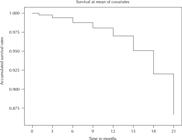ABSTRACT
OBJECTIVE
To monitor the number of oral health teams implemented in the Family Health Strategy after National Primary Care Policy 2017.
METHODS
This is a study of quantitative, descriptive and analytical nature that used the data from the public reports of the history of oral health coverage available in the e-Manager platform of Primary Care of the Ministry of Health of all Brazilian municipalities (5,570). The survival rate of the municipalities that did not reduce the number of oral health teams was analyzed according to the region of the country, human development index, Gini inequality index and population size. Cox regression was used to analyze the factors associated with the decrease in the number of teams implanted after 1, 3, 6, 9, 12, 15, 18 and 21 months of publication of the 2017 national policy ordinance, considering the hazard ratio (HR) and p < 0.05.
RESULTS
After 21 months of publication of the policy, 6.7% of Brazilian municipalities reduced the number of oral health teams. This reduction was higher in the South (6.7%) and Northeast (4.8%), in municipalities with the highest human development index, i.e., greater than or equal to 0.7 (5.6%), more unequal in terms of income distribution (Gini index > 0.62) and larger population size (more than 100,000 inhabitants). Municipalities in the Northeast (HR = 1.220) and South (HR = 1.771) regions had a higher chance of reducing the number of teams compared with those in the North region. More unequal municipalities (HR = 6.405) and with larger population size (HR = 4.273) were also more likely to reduce the coverage of oral health teams.
CONCLUSION
The municipalities that reduced the number of oral health teams in the Family Health Strategy are from the South and Northeast regions, with greater social inequality and larger population size. This scenario can significantly affect the population’s access to dental health services in the Unified Health System, especially among those in need.
Dental Health Services; Patient Care Team; Family Health Strategy; Health Status Disparities

 Thumbnail
Thumbnail
 Thumbnail
Thumbnail
 Thumbnail
Thumbnail
 Jan: January; Feb: February; Mar: March; Apr: April; May: May; Jun: June; Jul: July; Aug: August; Sep: September; Oct: October; Nov: November; Dec: December
Jan: January; Feb: February; Mar: March; Apr: April; May: May; Jun: June; Jul: July; Aug: August; Sep: September; Oct: October; Nov: November; Dec: December
 HDI: human development index
HDI: human development index
 HDI: human development index
HDI: human development index